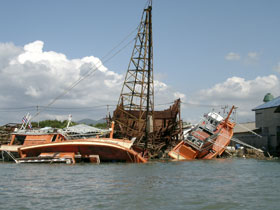UConn Fisheries Specialist Helps Turn
Disaster into Opportunity in Thailand
 |
|
Destruction of commercial fishing boats in one of the harbors of Thailand’s Phuket province bears witness to the devastating force of the tsunami, which left more than 80 percent of the island’s coastal infrastructure damaged. Professor Robert Pomeroy is helping reconstruct a sustainable fisheries industry in Thailand. |
| Photo courtesy of Charmproject from Thailand |
The outcome of efforts to reconstruct Thailand’s coastal tourism and fishery industries, devastated by last month’s tsunami, will influence the rehabilitation of that nation’s marine resources for years to come, predicts Robert Pomeroy.
“I call it changing disaster into opportunity,” said Pomeroy, an associate professor of agricultural and resource economics and fisheries extension specialist for Connecticut Sea Grant at the Avery Point campus, after his return from the battered Southeast Asian nation last week. “Much of the region’s economy, based on fishing and tourism, was unsustainable. There is now the opportunity to step back and apply many of the lessons we have learned through the years to help reconstruct sustainable fishing communities and coastal development that will last and make their lives better.”
Pomeroy was in the neighboring country of Malaysia conducting research a week after 30-foot-high waves, triggered by an earthquake on Dec. 26, crashed down on the Andaman Sea coast of Thailand, washing away whole towns and killing thousands.
Before joining UConn in 2002, Pomeroy worked at the World Resources Institute on marine resource economics projects in more than 40 nations. Considered one of the world’s leading experts in fisheries economics, he lived in Southeast Asia for more than 20 years, helping develop fisheries management strategies.
Within a week of the disaster, officials from the U.S. State Department contacted Pomeroy’s department head, Emilio Pagoulatos, requesting that he be loaned to the department to assist in “identifying priority needs to help put Thai fishing communities back on their feet.”
Pomeroy noted that the Thai government did not request financial aid.
“Thailand has a well developed economy, has resources and trained people,” he said. “What they asked for was technical assistance, and our needs assessment was based on that.”
Before leaving Thailand last week, Pomeroy and a colleague from the National Oceanic and Atmospheric Administration, Leah Bunce, delivered their assessment to both U.S. Embassy officials in Bangkok and government officials in Washington, D.C.
Among other things, it calls for “integrated coastal management planning, the development of a disaster management plan for tourists and fisheries, and a comprehensive assessment, monitoring, and rehabilitation program for coral reefs, beaches, forests, sea grass beds, mangroves, and other shoreline vegetation,” he said. “It also proposes an assessment of the feasibility of the engineering of wave breaks to forestall coastal erosion and allow for beach nourishment.”
Pomeroy said his years of involvement in Thailand paid off.
“We wanted a full perspective of their concerns,” he said, explaining that he met with officials at the national, provincial and local levels. “I know many of these people and it was easy for me to get access.”
On his first day in Thailand, for example, Pomeroy went to the Thai Department of Fisheries and within 10 minutes was sitting with the deputy director general of fisheries in charge of tsunami response, he said. Similarly, when he traveled to the devastated province of Phuket, he had “immediate access to the governor, when others didn’t.”
To begin with, he said, the Thais didn’t know how best to organize and coordinate all the aid that was being offered. “I was sitting in meetings with officials from 10 different embassies, several United Nations organizations, and many regional and NGO organizations.”
Now, five weeks after the disaster, Pomeroy said the urgent humanitarian relief work has been dealt with and medium and long-range planning is underway to rehabilitate the economy and natural resources.
Thai government officials and agencies are grappling with when, or whether, all the displaced people can go home, he said, and some of their decisions are controversial. Officials in the province of Phuket, for example, have imposed a 50-meter setback from the coast for any rebuilding. And the governor of Krabi Province has banned any reconstruction on the devastated Phi Phi island, until a coordinated strategy is fashioned for how best the island should be redeveloped.
“We’re beginning to see some government officials take positions that reflect their re-thinking how they are going to reconstruct the region’s economy in a more sustainable way,” said Pomeroy. “It’s been enlightening to witness that.”

